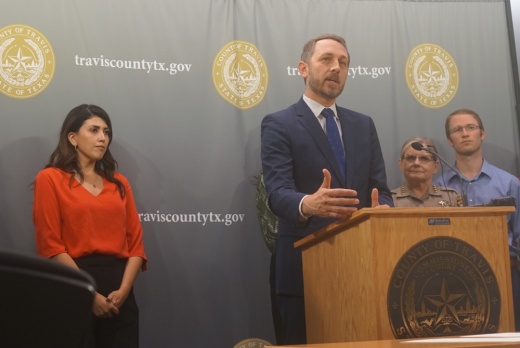The overview
City and county leaders met June 5 to announce a new mental health pilot program that will launch this fall.
The pilot program has an estimated $6 million cost and could be run in the old Ronald McDonald House on East 15th and Trinity streets as well as in a building on Airport Boulevard.
The county also unveiled a roughly $2 million plan to beef up its data sharing system between the Austin Police Department, the Travis County Sheriff’s Office, medical entities and homelessness organizations.
The new data sharing system would flag individuals with a mental illness, so if an arrest were to happen, law enforcement would understand their history and determine if they are eligible for the diversion center, Brown said.
“They're all siloed,” Brown said. “And that makes it difficult. If [a resident] gets arrested, and [they] have a mental health history with Integral Care right now, the sheriff's office doesn't necessarily know about [their] history.”
Terms to know
A mental health diversion center aims to break the cycle of nonviolent, repeat offenders going in and out of jail by bringing them to a facility with mental health services instead of into custody or an emergency room.
What the experts say
An increasing number of residents are reporting mental illness and cycling through Travis County’s jail system, according to a report compiled by Dr. Stephen Strakowski, a professor at The University of Texas Dell Medical School, and other members of the Forensic Mental Health Project.
Out of a sample of 2,231 arrested individuals, 106 both self-reported mental illness and cycled through the jail system at least three times. One individual had been arrested 89 times.
Further, about 40% of the county’s existing jail population self-reported having a mental illness, up from about 21% in 2020.
The details
Brown said the pilot program will help the county nail down what policies work and which ones don’t before a permanent diversion center is built.
Officials still need to figure out the ideal time guests would stay at the center to receive adequate care and avoid having any unhoused guests return to homelessness while also maintaining enough beds for new patients.
County officials also need to figure out if they can legally take people accused of nonviolent crimes to the diversion center and avoid entering the criminal justice system.
Next steps
The county formed a task force with city and county staff, community organizations, and mental health service providers that will work over the next several months to form the pilot program.
“What I hope we do now as a community is push ourselves over these hot summer months to figure out how, by the time fall comes, we’re operating differently,” Travis County Commissioner Ann Howard said at the conference.





